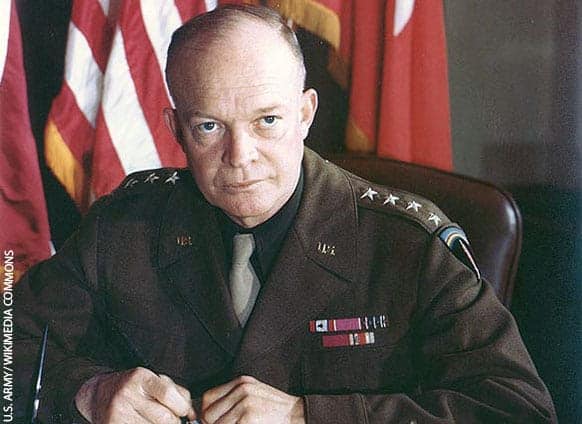Originally Published Aug 2016
History tells our past and guides our future, but only if we assess it with honesty.
Several years ago, my wife, Loveanne, and I went on a trip to Europe.
Those who don’t know me will soon find out that I am quite the history buff. Part of that is because there have always been people at the front of movements, through conflict or unity, through celebration and war, leading the cause.
With history, I love to explore the lives of those people and where their hearts were, the people, places, and things they dedicated their lives to. So, while I was in Normandy for a few days, I made it my mission to explore the life of General Dwight Eisenhower.
Now, I want to take some of the lessons I learned exploring Dwight Eisenhower’s life and apply them to a historical leadership context for you, focusing on the great leadership lessons and defined leadership attributes that made Operation Overlord, the invasion of Normandy, a success.
1. Being a Likeable Leader
Eisenhower loved and cared for his troops. He understood that when you go into a battle, it’s teamwork and that love and care for one another will see a hard time through.
For any team dynamic that thrives, there has to be genuine care and concern for one another. It is up to a good leader to create that environment for their team. With likeability comes openness, respect, and the ability to create a team environment that allows everyone to share and grow.
“Likeable” isn’t just a measure of charm in the top dogs, but instead, it includes effective communication, emotional intelligence, and a strong understanding that strengths and weaknesses are all important qualities that help build trust and compose a stable team.
Likeability isn’t always the first thing we think of as leaders. A lot of people these days are focused on getting things done that they aren’t taking the time to think about the impression they’re making or the environment they’re creating. That way of thinking is a mistake because, though you can’t make everyone happy, your lasting impression will make a difference in how people perceive you and what you have to say.
“Morale is born of loyalty, patriotism, discipline, and efficiency, all of which breeds confidence in self and in comrades…
Morale is at one and the same time the strongest and the most delicate of growths.
It withstands shocks, even disasters of the battlefield, but can be destroyed utterly by favoritism, neglect or injustice.”
2. Practicing Optimism
Eisenhower knew that to have positive, confident troops, he would have to lead by example.
“Optimism and pessimism are infectious and they spread more rapidly from the head downward than in any other direction.”
It isn’t hard to start viewing the future as a big question mark. When the big picture gets blurry, it becomes harder to navigate with confidence. However, as a leader, you are gifted with strong leadership qualities, one of which is not letting circumstances sour your attitude. Part of your job as a leader is to keep the morale of your team lifted and determined. No one can thrive when they’re being weighed down by heavy, negative energy.
As an effective leader, you must remember: you set the tone for your team.
3. Controlling Your Ego
Eisenhower managed the egos of others, pulling them together for a common cause. He was effective because he could subjugate his own ego, and he saw himself as a normal GI.
“Always take your job seriously, but never yourself.”
I have always liked to look at leading a team as movement forward, not movement upward. As a leader moves through a journey with their team members, they are all on the same level moving toward the common goal ahead of them. Leaders must invest from within their team.
4. Knowing Your Purpose
Eisenhower sold his people on the mission and got his men engaged in the larger cause—he was always able to make sure the team understood the “why” behind the “what.”
“Soldiers, sailors and airmen of the Allied Expeditionary Forces, you’re about to embark upon the great crusade toward which we have striven all these many months. The eyes of the world are upon you. The hopes and prayers of liberty-loving people everywhere march with you.”
One of the most helpful leadership qualities is a leader’s ability to convey the bigger picture to their team members. This starts with a leader knowing their own purpose first. When a leader can see where they belong in an equation, they can help others see where they fall in line.
Everyone on your team has a purpose, a reason for being where they are right now. As the leader of a team, I encourage you to recognize “why” to best understand where people belong and how you can all work together to fulfill an even higher purpose.
5. Taking Responsibility
Too often, leaders want the credit, but when things don’t go well, they don’t want the blame. Eisenhower was different. Here was a man at the greatest moment of his life, who knew his attempts might not succeed, so he wrote a letter—“In Case of Failure”—because he was willing to take the blame.
“Our landings in the Cherbourg-Havre area have failed to gain a satisfactory foothold, and I have withdrawn the troops. My decision to attack at this time and place was based upon the best information available. The troops, the air, and the Navy did all that bravery and devotion to duty could do. If any blame or fault attaches to the attempt, it is mine alone.”
Eisenhower did not step away from blame. As leaders, we also cannot pass the buck. One thing I live by every day is the principle of “always be the first to apologize.”
Accepting failure on behalf of your team follows the same idea: discount your pride. When we accept leadership, we have to put our pride aside. Regardless of the mistake, accepting the situation and moving forward to the solution is a true leadership quality that sets real leaders apart.
Real leadership takes guts. It takes commitment; it takes toughness—and Eisenhower used his skills to free Western civilization. Most of us will never be called on to do anything that great, but we must go out every day and put our best leadership qualities to work to be the best leader we can be. It is up to us to hone our leadership qualities, invest in our personal development, commit to well-rounded problem-solving, and do everything within our power to create and encourage a healthy, successful team.









❤️🦋❤️🇺🇸❤️🦋❤️
Loved this. Inspiring. Will pass it along. Got my heart!
Thank you, AK. I am so happy to provide y’all with useful information in whatever form that might be.